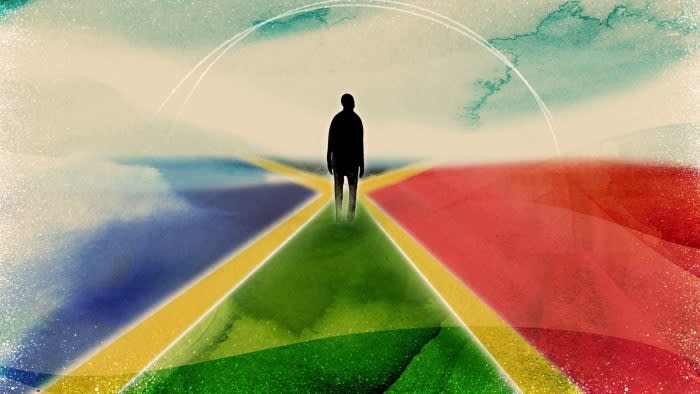Unlock the Editor’s Digest for free
Roula Khalaf, Editor of the FT, selects her favourite stories in this weekly newsletter.
Cyril Ramaphosa played a crucial role in negotiating a peaceful transition from apartheid to democracy. Now — 30 years after South Africa’s first free elections in 1994 — the president has to manage a second vital transformation for his nation.
After three decades governing alone, the African National Congress, led by Ramaphosa, lost its overall majority in the recent national elections. The transition from single-party rule to multi-party government is less dramatic than the end of white supremacy. But South Africa’s future as a functioning state and a peaceful democracy could depend on Ramaphosa getting it right.
For a man facing such a formidable challenge — whose party has just recorded a historic low of 40 per cent of the vote — Ramaphosa seems relaxed and confident.
I met the 71-year-old president at his home in Johannesburg over the weekend, just after he had returned from a 10km walk. Sitting in a tracksuit before a roaring fire, Ramaphosa drew on the experience of forming the first post-apartheid government for inspiration.
Back then, Nelson Mandela formed a government of national unity. Ramaphosa is now reaching for the same model. “The people have sent us a message. They have decided we have to work together,” he says.
There is an obvious problem with this high-minded message. The main opposition parties detest each other and have diametrically opposed platforms. The Democratic Alliance, which came second in the polls with 22 per cent of the vote, wants market-based reforms. The uMkhonto weSizwe (MK) party and the Economic Freedom Fighters — which came third and fourth respectively — demand nationalisations and radical redistribution of wealth.
But Ramaphosa’s apparent naivete may disguise a shrewd political calculation. The MK and the EFF are currently refusing to join coalition talks. The president says with a shrug: “Those who are not willing to join will marginalise themselves.”
The marginalisation of the two most radical opposition parties would carry its own dangers. The MK, led by former president Jacob Zuma, has followed a Trump-like strategy of claiming electoral fraud and hinting at street violence. These are not empty threats. Zuma supporters were behind an uprising in 2021 that left more than 300 dead. But the government believes it is better prepared this time. Extra police are already being moved into Kwazulu-Natal province, the MK’s power base.
Avoiding violence is crucial to South Africa’s second transition. But it will not be enough. The country is in trouble. Growth is low and the unemployment rate is 32 per cent. The lives of ordinary people are plagued by crime, corruption and crumbling infrastructure.
One of the first signs a visitor sees on leaving Johannesburg airport is a giant billboard advertising armoured cars, with the snappy slogan — “Arrive not dead.” Last week, a World Bank report on the efficiency of more than 400 container ports ranked Cape Town last in the world, with Durban in the bottom 10. That is a disastrous handicap for South African exporters.
The corruption and incompetence of the Zuma years from 2009 to 2018 took a huge toll on the nation. But Ramaphosa has disappointed those who hoped he would bring about a rapid transformation after forcing out Zuma. Even some of the president’s friends shake their heads at what they regard as his excessive caution when decisive action is needed.
Ramaphosa’s defenders argue that radical reforms were never possible, given the entrenched interests and leftist ideology of the ANC cadres. They argue that nonetheless, he has managed to push through some important changes — such as allowing a greater role for the private sector in electricity generation. The crippling power cuts that South Africa has suffered from seem to be easing as a result.
This model of encouraging greater private-sector involvement is now being extended to the ports. Ramaphosa supporters talk hopefully of raising South Africa’s growth to over 3 per cent a year, by following the path of moderate reform. But that goal may well be delusional. Recent history suggests that the ANC is too corrupt and incompetent to lead the reform process. The DA may be unable to improve matters much as a junior party in a coalition government that is still led by the ANC, or it may agree to prop up a minority ANC government from the outside.
The DA may nonetheless agree to some such arrangement for fear that if it brings down Ramaphosa’s ANC, the alternative would be a populist alliance incorporating the MK and the EFF.
Much as Joe Biden’s liberal critics criticise his administration’s failure to move faster to prosecute Donald Trump in the US, so Ramaphosa’s critics lament the fact that Zuma has not been properly held to account for corruption or the insurrection of 2021. But, like Trump, Zuma has an uncanny ability to shake off criminal charges.
Confrontation is anyway not Ramaphosa’s style. His preference is to be a conciliator and to play the long game. That instinct is once again coming to the fore, in his efforts to form a government of national unity.
Ramaphosa seems confident and relaxed as he sets about negotiating South Africa’s second transformation. But there is a fine line between calmness and complacency. South Africans have to pray that their president has got the balance right.
gideon.rachman@ft.com
Source link : https://www.ft.com/content/af4cd921-7c55-4458-926c-0293712e17f7
Author :
Publish date : 2024-06-10 11:39:13
Copyright for syndicated content belongs to the linked Source.
